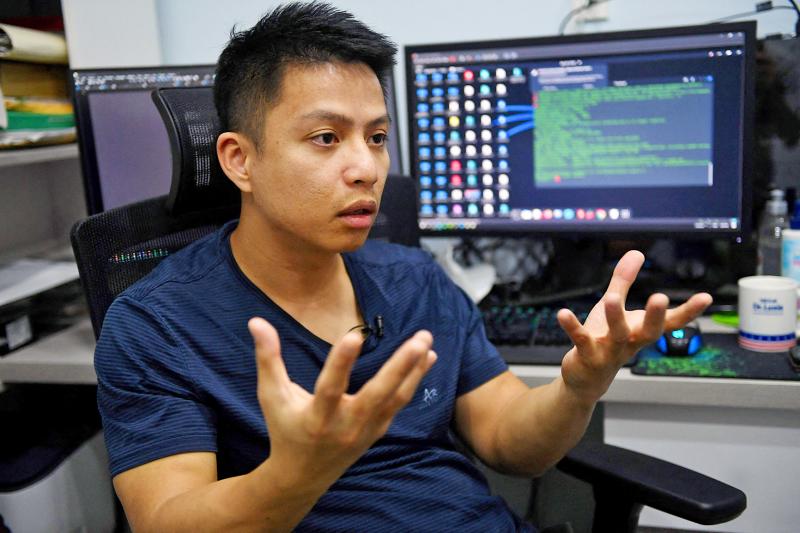At the height of his career, Vietnamese hacker Ngo Minh Hieu made a fortune stealing the personal data of hundreds of millions of Americans.
Now he has been recruited by his own government to hunt the kind of cybercriminal he once used to be.
After serving seven years in US prisons for stealing the personal details of about 200 million Americans, Ngo was sent back to Vietnam, which imposes some of the world’s strictest curbs on online freedom.

Photo: AFP
Ngo said that he has since turned his back on his criminal past.
“I fell to the bottom, now I am trying to climb up again,” the 32-year-old said. “Though I don’t earn much now, I have peace instead.”
However, his transformation is complicated.
Ngo said that his new job involves educating Vietnamese about the dangers of the same sort of hacking he perpetrated, but he is also working on cybersecurity for the government of a one-party state that cracks down ruthlessly on dissent, harassing and arresting people for posting critical opinions online.
Nicknamed HieuPC when he was 12, Ngo was fascinated by computers as soon as he first laid his hands on one, but he was soon racking up US$1,000 fines for stealing Internet connections for his own personal use.
He began hacking into foreign bank accounts, netting up to US$600 a day in high school and using the money to study cybersecurity in New Zealand.
Ngo was forced to return home in 2010 after hacking his university and selling students’ personal information, and his illegal activities spiraled.
In his 20s, he made US$100,000 a month hacking and selling about 200 million US social security numbers.
“I was on the top of success. I was over-proud of myself. I wanted more villas, more apartments, more luxurious cars,” Ngo said.
Then, in February 2013, he was lured to the US in a sting operation and promptly arrested on landing.
“I don’t know of any other cybercriminal who has caused more material financial harm to more Americans than Ngo,” US Secret Service agent Matt O’Neill, who executed the plan to catch Ngo, told KrebsOnSecurity.com, a blog dedicated to cybersecurity.
Ngo was initially given a sentence of 45 years, later reduced to 13.
“I had fallen to the bottom, losing everything in my life,” Ngo said. “I thought of hanging myself.”
However, he struggled through and was released in 2019, returning to Vietnam in 2020.
The former millionaire now lives in an average apartment in Ho Chi Minh City and works at the state-owned National Cyber Security Center.
“We’re focused on hunting criminals and thwarting cyberattacks,” he said, declining to comment on Vietnam’s increasingly repressive approach to online censorship.
A new cybersecurity law came into effect in 2019 that Amnesty International has said grants the government “sweeping powers to limit online freedom” and target those who post opinions it dislikes.
The UN Human Rights Council in 2019 criticized the law for imposing “severe restrictions on freedom of expression and opinion.”
Rights advocates and bloggers have been arrested, with some even jailed on charges of spreading propaganda against the state, and Amnesty last year said that government-linked hackers were targeting rights advocates.
Ngo said that his work as a “threat hunter” is not political, but focused on criminal hackers, tracking those who are trying to steal the data of Vietnamese.
Ngo travels the nation speaking at schools and universities about the importance of cybersecurity, as well as the consequences of data being stolen.
While the government is pushing public awareness, Ngo said many Vietnamese had little understanding of cybercrime.
“Now I still hack, but I hack fraudulent Web pages or try to understand data that blackhat hackers are trading online to trace them and find out who they are,” he said. “Hacking is like a knife, which you may give to someone who wants to use it on something — bad or good.”

VENEZUELAN ACTION: Marco Rubio said that previous US interdiction efforts have not stemmed the flow of illicit drugs into the US and that ‘blowing them up’ would US President Donald Trump on Wednesday justified a lethal military strike that his administration said was carried out a day earlier against a Venezuelan gang as a necessary effort by the US to send a message to Latin American cartels. Asked why the military did not instead interdict the vessel and capture those on board, Trump said that the operation would cause drug smugglers to think twice about trying to move drugs into the US. “There was massive amounts of drugs coming into our country to kill a lot of people and everybody fully understands that,” Trump said while hosting Polish President

A French couple kept Louise, a playful black panther, in an apartment in northern France, triggering panic when she was spotted roaming nearby rooftops. The pair were were handed suspended jail sentences on Thursday for illegally keeping a wild animal, despite protesting that they saw Louise as their baby. The ruling follows a September 2019 incident when the months-old feline was seen roaming a rooftop in Armentieres after slipping out of the couple’s window. Authorities captured the panther by sedating her with anesthetic darts after she entered a home. No injuries were reported during the animal’s time on the loose. The court in the

Japan yesterday heralded the coming-of-age of Japanese Prince Hisahito with an elaborate ceremony at the Imperial Palace, where a succession crisis is brewing. The nephew of Japanese Emperor Naruhito, Hisahito received a black silk-and-lacquer crown at the ceremony, which marks the beginning of his royal adult life. “Thank you very much for bestowing the crown today at the coming-of-age ceremony,” Hisahito said. “I will fulfill my duties, being aware of my responsibilities as an adult member of the imperial family.” Although the emperor has a daughter — Princess Aiko — the 23-year-old has been sidelined by the royal family’s male-only

For more than a century, the fate of the dazzling Darya-e-Noor diamond has been sealed inside a bank vault — a mystery that haunts Khawaja Naim Murad, great-grandson of the last prince, or nawab, of Dhaka. Locked away in 1908, were the family’s heirlooms lost during the violence at the end of British rule in 1947? Did they survive Bangladesh’s war of independence in 1971 and the string of coups that followed, or are they still safe, dusty, but untouched? Many suspect that the jewels are long gone and officials at the state-run bank hesitate to simply open the vault, fearing that they